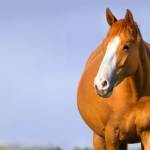Mares Eating for Two: What’s New?

Some pregnant mares have changes in feed preferences and feeding behaviors that may benefit their growing fetuses. Those same “cravings,” however, may also be potentially harmful to their own health. These were the key findings recently reported by researchers from Southern Illinois University.*
In this novel study, five pregnant mares in the last 120 days of gestation and four open mares were offered small amounts (0.5 lb or 0.23 kg) of a concentrate with one of three oil-based palatants. A palatant is any ingredient used to make a feed, supplement, or treat taste better. Based on previous studies on preferred flavors, apple and anise palatants were tested, and corn oil served as a control.
The three portions were placed in separate pans beside one another in an empty test stall for three consecutive days for a total of five observation periods. Horses had access to all three feed pans for 20 minutes. Each session was video recorded, and various behaviors were documented. These included smelling and hovering over the portions as well as ingesting and chewing behaviors. Time taken to smell and finish each diet were also recorded.
Gestating mares demonstrated significantly more olfactory behaviors compared to open mares. Further, their consumption rate was significantly faster, particularly for the apple-flavored feed. The pregnant mares also exhibited fewer stress-related behaviors during the testing periods, such as pawing, pacing, and elimination.
“The researchers suggested that the increase in olfactory investigation of the feeds prior to consumption could be an evolutionary mechanism designed to encourage more careful examination of feedstuffs prior to consumption,” explained Katie Young, Ph.D., a nutritionist for Kentucky Equine Research.
She added, “This increased investigation of a feed prior to ingestion could help mares avoid consuming feeds that are potentially toxic or harmful to the developing fetus.”
On the flip side, pregnant mares consumed the feeds relatively rapidly, which may negatively affect their own health over time.
“During the last months of pregnancy, a mare may require 30% more daily calories than a mare at maintenance or in early pregnancy. This higher caloric demand may help explain the increase in rate of feed intake in the pregnant mares observed in this study,” she said.
Any horse that consumes feed quickly, however, is at risk of choke or even colic. “Bolting feed increases the risk of choke as inadequate chewing may allow large feed particles to block the esophagus. Chewing also stimulates saliva production in horses, which helps moisten and move feed particles through the esophagus. Thus, decreased chewing may result in insufficient saliva production, also contributing to choke.”
According to the study, the changes in feeding behavior and olfaction could be related to hormone levels. In other species, the decreased estrogen and increased progesterone production that occurs in the latter stages of pregnancy may bump up feed intake.
In addition to ensuring mares receive diets with sufficient calories to meet their higher energy needs, their diets must be balanced to supply essential nutrients, such as amino acids, vitamins, and minerals, to support their own requirements as well as those of the growing fetus.
“A concentrate feed formulated for broodmares that contains high-quality protein sources and appropriate vitamin and mineral supplementation along with good-quality forage is usually a good ration for pregnant mares,” Young recommended. “In some situations, an easy-keeping pregnant mare with access to high-quality pasture or hay may meet her calorie needs without additional feed or with lower than minimum recommended amounts of a fortified feed for pregnancy. In such cases, a balancer pellet will provide essential nutrients without adding additional calories that may result in excessive weight gain.”
*Crowell, C.N., J.M. Fenton, and E.B. Perry. 2022. Influences of oil-based palatants on eating behavior in gestating mares. Journal of Equine Veterinary Science 118:104115.








